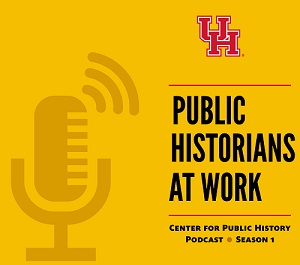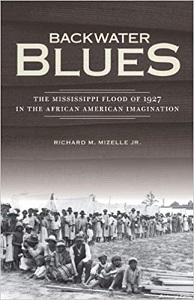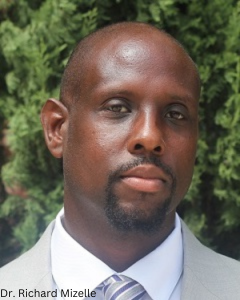From the CPH Archives: Cultivating Public Memory During Disease and Disaster: Richard Mizelle
In the first season of the Center for Public History’s Public Historians at Work podcast, Dr. Wes Jackson interviewed Dr. Richard Mizelle, Associate Professor of History at University of Houston, who specializes in race, medicine and disasters. They discuss Mizelle’s book, Backwater Blues: The 1927 Mississippi River Flood in the African American Imagination and the relationship of past and ongoing health crises.

Part of Dr. Mizelle’s work has been to draw attention to the ways that epidemics or disasters are minimized, ignored, or erased within larger public narratives, particularly in cases where African American communities are disproportionately hurt and affected.
The 1927 Flood is a prime example of a national disaster that has largely faded within national memory. Dr. Mizelle likens it to the catastrophe of the Chicago Fire of 1827 and the 1906 San Francisco Earthquake, both of which have seen a great deal of remembrance and even commemoration in American public consciousness. Unlike these disasters, however, the flood occurred over the course of several months, and along the course of the Mississippi from Illinois to New Orleans. The lack of “central lacuna” for this disaster, according to Dr. Mizelle, prevented it from sticking in public memory, as the issue was too multi-varied to be held onto.
Additionally, those subjected and vulnerable to the effects of the flood were largely Black populations that were largely kept out of the archival project for preserving national memory. Dr. Mizelle points out this was a result of both the lack of access for Black individuals for creating traditional archival material, as well as the neglect of those in the national archives to obtain stories related to the Black experience.
For example, lack of literacy might prevent those who experienced the flood firsthand from writing about their experiences while lack of interest might keep recordkeepers of the time from getting oral histories.

Therefore, as discussed in the podcast and in his book Backwater Blues: The 1927 Mississippi River Flood in the African American Imagination, Dr. Mizelle turned to and, in fact, encourages other public historians to turn to unconventional sources in searching for forgotten historical experiences. For Mizelle, this meant careful research into blues music recordings and texts of historical fiction. Here, he says that blues “not just filled the gap, but they were [an] important explanatory framework” for understanding the experience of this disaster, “but also the powerful ideological contributions of blues itself.”
Similar to the 1927 Mississippi River Flood, the narratives surrounding diabetes are likewise problematic. While the disease remains strong public consciousness, narratives of blame are often attached to the illness, particularly when the patients are Black. Referring to some of the medical literature on diabetes-related amputation, Dr. Mizelle reflects that patients are too often blamed for their own condition and accused of failing to maintain their own health.
These narratives of blame and misinformed assumptions about the disease within the Black community have hindered a more accurate understanding of diabetes as well as better care for those suffering from the illness. Mizelle points out that public perception and public knowledge of diabetes is often paired with the assumption that Black persons mostly suffer from type 2 diabetes. Unfortunately, this assumption has led to physicians failing to properly diagnose the very real type 1 diabetes cases. Additionally, narratives of blame related to diabetes for Black patients ignore the realities of food desserts for many underserved, Black communities, where nutritious, filling food is often out of reasonable reach.

Even if we think we know about diabetes, or we think that the public is well-informed about its causes and effects, there is a larger, more complicated narrative, according to Dr. Mizelle, but the realities of the illness are often obfuscated, mutated and scratched out of public memory.
Similarly, COVID-19 is also an ongoing disease that disproportionately affects Black persons as a result of uneven access to healthcare, food, and stress, and is also subject to misconception and obfuscation in public memory. Here, though, Dr. Mizelle expresses hope that his and others’ work in public history might help to provide a more accurate picture not just of this pandemic but also of those diseases, which have been “put in the dust bin of history.”
Indeed, Dr. Mizelle says that public historians have an ethical imperative to address these disparities in public perception and memory, bringing academic research not just to the layperson’s attention but also to the attention of physicians and other professional classes.
You can listen to the full interview here: https://publichistoriansatwork.buzzsprout.com/1267733/8279215-cultivating-public-memory-during-disease-and-disaster-richard-mizelle.
Check out Dr. Mizelle’s book. Backwater Blues: The 1927 Mississippi River Flood in the African American Imagination here: https://www.upress.umn.edu/9780816679263/backwater-blues/.